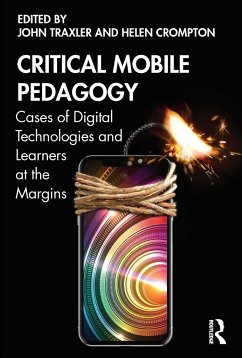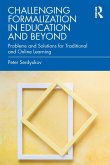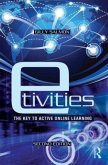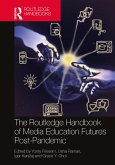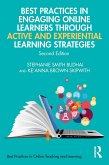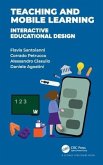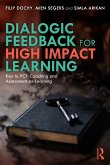Critical Mobile Pedagogy
Cases of Digital Technologies and Learners at the Margins
Herausgeber: Traxler, John; Crompton, Helen
Critical Mobile Pedagogy
Cases of Digital Technologies and Learners at the Margins
Herausgeber: Traxler, John; Crompton, Helen
- Broschiertes Buch
- Merkliste
- Auf die Merkliste
- Bewerten Bewerten
- Teilen
- Produkt teilen
- Produkterinnerung
- Produkterinnerung
Critical Mobile Pedagogy is an exploration of mobile technologies for designing and delivering equitable and empowering education around the globe.
Andere Kunden interessierten sich auch für
![Challenging Formalization in Education and Beyond Challenging Formalization in Education and Beyond]() Peter SerdyukovChallenging Formalization in Education and Beyond39,99 €
Peter SerdyukovChallenging Formalization in Education and Beyond39,99 €![E-tivities E-tivities]() Gilly SalmonE-tivities41,99 €
Gilly SalmonE-tivities41,99 €![The Routledge Handbook of Media Education Futures Post-Pandemic The Routledge Handbook of Media Education Futures Post-Pandemic]() The Routledge Handbook of Media Education Futures Post-Pandemic227,99 €
The Routledge Handbook of Media Education Futures Post-Pandemic227,99 €![Best Practices in Engaging Online Learners Through Active and Experiential Learning Strategies Best Practices in Engaging Online Learners Through Active and Experiential Learning Strategies]() Stephanie Smith BudhaiBest Practices in Engaging Online Learners Through Active and Experiential Learning Strategies34,99 €
Stephanie Smith BudhaiBest Practices in Engaging Online Learners Through Active and Experiential Learning Strategies34,99 €![Teaching and Mobile Learning Teaching and Mobile Learning]() Flavia SantoianniTeaching and Mobile Learning85,99 €
Flavia SantoianniTeaching and Mobile Learning85,99 €![Research Methods in Digital Food Studies Research Methods in Digital Food Studies]() Research Methods in Digital Food Studies39,99 €
Research Methods in Digital Food Studies39,99 €![Dialogic Feedback for High Impact Learning Dialogic Feedback for High Impact Learning]() Filip DochyDialogic Feedback for High Impact Learning27,99 €
Filip DochyDialogic Feedback for High Impact Learning27,99 €-
-
-
Critical Mobile Pedagogy is an exploration of mobile technologies for designing and delivering equitable and empowering education around the globe.
Hinweis: Dieser Artikel kann nur an eine deutsche Lieferadresse ausgeliefert werden.
Hinweis: Dieser Artikel kann nur an eine deutsche Lieferadresse ausgeliefert werden.
Produktdetails
- Produktdetails
- Verlag: Taylor & Francis Ltd
- Seitenzahl: 246
- Erscheinungstermin: 27. November 2020
- Englisch
- Abmessung: 229mm x 152mm x 13mm
- Gewicht: 358g
- ISBN-13: 9780367204570
- ISBN-10: 0367204576
- Artikelnr.: 60013937
- Herstellerkennzeichnung
- Libri GmbH
- Europaallee 1
- 36244 Bad Hersfeld
- gpsr@libri.de
- Verlag: Taylor & Francis Ltd
- Seitenzahl: 246
- Erscheinungstermin: 27. November 2020
- Englisch
- Abmessung: 229mm x 152mm x 13mm
- Gewicht: 358g
- ISBN-13: 9780367204570
- ISBN-10: 0367204576
- Artikelnr.: 60013937
- Herstellerkennzeichnung
- Libri GmbH
- Europaallee 1
- 36244 Bad Hersfeld
- gpsr@libri.de
John Traxler is Professor of Digital Learning in the Education Observatory at the University of Wolverhampton, UK. He has been invited to establish a UNESCO Chair in Innovative Informal Digital Learning in Disadvantaged and Development Contexts. Helen Crompton is Associate Professor of Instructional Technology in the Department of Teaching and Learning at Old Dominion University in Norfolk, Virginia, USA. She is part of the UNESCO Chair in Innovative Digital Learning in Disadvantaged and Development Contexts.
Introduction 1. The Ju 'hoan of Nyae Nyae: a case of exclusion and Ka jan
2. Combining robust technology and gamified learning to democratize access
to growth mindset 3. Our Town: Towards creative mobile learning in
community focussed place-based education 4. Digital Inequities in Rural
Alaska 5. Mobile Device Literacy: Status and Needs of Women in Senegal 6.
Supported mobile learning in the "Third Spaces" between non-formal and
formal education for displaced people 7. Towards Participatory MOOCs 8.
Mobile information literacy and public access in the era of post-truth:
reflections from community curricular experiences in Latin America. 9.
Awakening Sleeping Languages in Saskatchewan with Culturally Appropriate
Curricula and Technology 10. Empathy-driven mobile app development (MAD)
without coding: A case of citizen developers 11. Technology-Enhanced Higher
Education for Refugees 12. Disadvantaged learners and the digital
contractor: a critical perspective on mobile learning in the Global South
with reference to Paolo Freire. 13. Mobile Learning project reports: a
contractor delivery review of three services for disadvantaged and
marginalised Global South learners 14. Post-Critical Mobile Pedagogy in
Aboriginal and Torres Strait Islander Contexts 15. Mobile Assisted Third
Space (MATS) in the margins: A tool for social justice and democracy
Conclusion: Breaking Hegemonic Structures and Conventions in Looking Toward
a Critical Mobile Pedagogy
2. Combining robust technology and gamified learning to democratize access
to growth mindset 3. Our Town: Towards creative mobile learning in
community focussed place-based education 4. Digital Inequities in Rural
Alaska 5. Mobile Device Literacy: Status and Needs of Women in Senegal 6.
Supported mobile learning in the "Third Spaces" between non-formal and
formal education for displaced people 7. Towards Participatory MOOCs 8.
Mobile information literacy and public access in the era of post-truth:
reflections from community curricular experiences in Latin America. 9.
Awakening Sleeping Languages in Saskatchewan with Culturally Appropriate
Curricula and Technology 10. Empathy-driven mobile app development (MAD)
without coding: A case of citizen developers 11. Technology-Enhanced Higher
Education for Refugees 12. Disadvantaged learners and the digital
contractor: a critical perspective on mobile learning in the Global South
with reference to Paolo Freire. 13. Mobile Learning project reports: a
contractor delivery review of three services for disadvantaged and
marginalised Global South learners 14. Post-Critical Mobile Pedagogy in
Aboriginal and Torres Strait Islander Contexts 15. Mobile Assisted Third
Space (MATS) in the margins: A tool for social justice and democracy
Conclusion: Breaking Hegemonic Structures and Conventions in Looking Toward
a Critical Mobile Pedagogy
Introduction 1. The Ju 'hoan of Nyae Nyae: a case of exclusion and Ka jan
2. Combining robust technology and gamified learning to democratize access
to growth mindset 3. Our Town: Towards creative mobile learning in
community focussed place-based education 4. Digital Inequities in Rural
Alaska 5. Mobile Device Literacy: Status and Needs of Women in Senegal 6.
Supported mobile learning in the "Third Spaces" between non-formal and
formal education for displaced people 7. Towards Participatory MOOCs 8.
Mobile information literacy and public access in the era of post-truth:
reflections from community curricular experiences in Latin America. 9.
Awakening Sleeping Languages in Saskatchewan with Culturally Appropriate
Curricula and Technology 10. Empathy-driven mobile app development (MAD)
without coding: A case of citizen developers 11. Technology-Enhanced Higher
Education for Refugees 12. Disadvantaged learners and the digital
contractor: a critical perspective on mobile learning in the Global South
with reference to Paolo Freire. 13. Mobile Learning project reports: a
contractor delivery review of three services for disadvantaged and
marginalised Global South learners 14. Post-Critical Mobile Pedagogy in
Aboriginal and Torres Strait Islander Contexts 15. Mobile Assisted Third
Space (MATS) in the margins: A tool for social justice and democracy
Conclusion: Breaking Hegemonic Structures and Conventions in Looking Toward
a Critical Mobile Pedagogy
2. Combining robust technology and gamified learning to democratize access
to growth mindset 3. Our Town: Towards creative mobile learning in
community focussed place-based education 4. Digital Inequities in Rural
Alaska 5. Mobile Device Literacy: Status and Needs of Women in Senegal 6.
Supported mobile learning in the "Third Spaces" between non-formal and
formal education for displaced people 7. Towards Participatory MOOCs 8.
Mobile information literacy and public access in the era of post-truth:
reflections from community curricular experiences in Latin America. 9.
Awakening Sleeping Languages in Saskatchewan with Culturally Appropriate
Curricula and Technology 10. Empathy-driven mobile app development (MAD)
without coding: A case of citizen developers 11. Technology-Enhanced Higher
Education for Refugees 12. Disadvantaged learners and the digital
contractor: a critical perspective on mobile learning in the Global South
with reference to Paolo Freire. 13. Mobile Learning project reports: a
contractor delivery review of three services for disadvantaged and
marginalised Global South learners 14. Post-Critical Mobile Pedagogy in
Aboriginal and Torres Strait Islander Contexts 15. Mobile Assisted Third
Space (MATS) in the margins: A tool for social justice and democracy
Conclusion: Breaking Hegemonic Structures and Conventions in Looking Toward
a Critical Mobile Pedagogy

